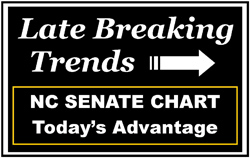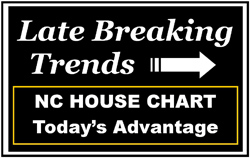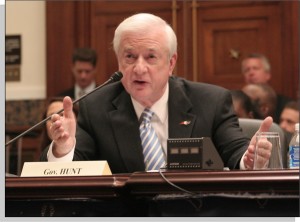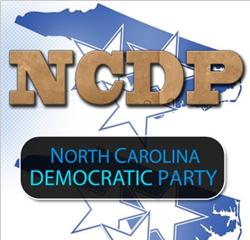“Hunt criticized the Democratic controlled General Assembly for raising taxes in 1991 during the recession, saying the budgetary shortfall was ‘sheer government mismanagement.’”[i] Rob Christensen, News & Observer, The Paradox of Tar Heel Politics Twenty-five years ago, in Washington DC, U.S. Senator Jesse Helms, a North Carolina Republican, was beginning his third term in the
[More…]
“Hunt criticized the Democratic controlled General Assembly for raising taxes in 1991 during the recession, saying the budgetary shortfall was ‘sheer government mismanagement.’”[i] Rob Christensen, News & Observer, The Paradox of Tar Heel Politics
Twenty-five years ago, in Washington DC, U.S. Senator Jesse Helms, a North Carolina Republican, was beginning his third term in the world’s greatest deliberative body.
In Raleigh, former two-term Governor Jim Hunt, a Democrat, was returning to the practice of law. He had lost to Helms in the 1984 epic battle of political titans in the US Senate race. Hunt was all washed up; a mere single-entry footnote in the annals of state political history. Wrong.
Jim Hunt, today’s patriarch of the North Carolina Democratic Party, went on to serve a third and fourth term as Governor, a first since 1776. He achieved an extraordinary and unprecedented list of accomplishments … not the least of which was the exalted partisan political triumph of becoming the state Republican Party’s worst nightmare of the past two-and-a-half decades.
As News & Observer political writer Rob Christensen pointed out in his book, The Paradox of Tar Heel Politics, “Hunt kept the Democratic Party from going under during a Republican tide by his political skills, ideological nimbleness, and the fact that he never stopped working.”[ii]
Jim Hunt has become the Michael Jordan, the David Thompson, and the Christian Laettner of modern-day North Carolina politics … that player that is simply better than everyone else on the court. You know the one … the one with the most wins.
This report examines the teachable personal qualities of Jim Hunt, such as “ideological nimbleness” and work ethic, along with the political skills that have made Jim Hunt the extraordinary winner that he has become. What if Hunt had gone to Washington DC in 1985 and Helms had stayed in North Carolina? Is there a Republican Jim Hunt?
Continue reading »
Part III: Liabilities 7-8 “Our first job is to vote out all politicians, local, state and federal, who work against the founding philosophy and principals of our country.”[i] W. David Stedman, Ret. Chmn., Stedman Corporation, Asheboro, The Destruction of the Great American Dream This is Part III in a series of reports suggesting that the
[More…]
Part III: Liabilities 7-8
“Our first job is to vote out all politicians, local, state and federal, who work against the founding philosophy and principals of our country.”[i]
W. David Stedman, Ret. Chmn., Stedman Corporation, Asheboro, The Destruction of the Great American Dream
 This is Part III in a series of reports suggesting that the North Carolina Democratic Party is much like the Toyota Motor Company in that they are both among the great organizational successes in American history, and both are losing market share because of sloppy standards and corrupt leaders.
This is Part III in a series of reports suggesting that the North Carolina Democratic Party is much like the Toyota Motor Company in that they are both among the great organizational successes in American history, and both are losing market share because of sloppy standards and corrupt leaders.
Forbes.com carried an editorial on April 26, 2010, titled, The Real Reason for Toyota’s Troubles, in which Kenneth Brill, founder of the Uptime Institute, hypothesized that the random catastrophic failure of Toyota’s acceleration systems was most likely the result of multiple and perhaps unrelated interacting causes. “At least five and as many as ten things must interact to produce the failure of a well-designed system,” said Brill, “Any one thing by itself will cause a problem but not a catastrophic event.”
What makes 2010 potentially catastrophic for North Carolina Democrats is that there are ten political liabilities unfolding at the same time. Any one or several of the Top 10 Political Liabilities Leading to a Loss of Market Share would not be politically catastrophic. Many times down through the decades, Democrats have weathered eras of corrupt leaders; they have overcome Republican-friendly years, weak governors, high turnover of incumbents, unpopular presidents, budget problems, economic slumps, anti-establishment voters, third party movements, low turnout, declining party loyalty, high unemployment, unpopular wars and a surge in opposition strength … but not at the same time like we are seeing today.
In Parts I and II of the series, I wrote about liabilities including:
#1: A Weak Democratic Governor Will be a Drag on Democratic Candidates
#2: Basnight’s Cash on Hand Down by 30% with a Tougher Hill to Climb
#3: Democrats have all of the Power and Get all of the Blame
#4: A Nation and State of Voters Fearing Financial Collapse Due to Spending
#5: Corrupt Leaders: Toyota the Safety Automaker; Perdue the Ethics Governor
#6: The Issue is the Economy, and Democrats Own the Economy
Here are liabilities 7 and 8:
#7: Regnat Populus! Dissatisfied Voters View “Ins” as Dismissive and Un-American
Wednesday, Gallup announced that so far in 2010, an average of only 23% of Americans are satisfied with the way things are going in the United States. The 2010 average is “well below the 40% historical average” over the past 30 years, and is the “lowest Gallup has measured in a midterm election year, dating to 1982.”[ii]
To put this percentage in perspective, the all-time high was 71% in February, 1999, when we were enjoying the longest period of economic expansion in U.S. history. The all-time low was 7% in October 2008, leading to catastrophic losses for the “ins”: Republicans.
The dissatisfaction sweeping the county first became apparent last summer with TV news footage of awkward and embarrassed incumbents taken aback by the ire of finger-wagging-in-your-face constituents at Town Hall Meetings. The political significance of the dissatisfaction played out with upsets in the governors’ races in Virginia and New Jersey, and with the shocking upset election of Republican Scott Brown in former Sen. Ted Kennedy’s seat.
In April, another key antiestablishment signal came with the stunning turnabout in the U.S. Senate GOP primary race in Florida, where incumbent GOP Gov. Charlie Crist dropped out to run as an Independent because the more conservative GOP candidate had a 2-to-1 advantage.
Last week, we saw the antiestablishment ouster of incumbents like Republican Bob Bennett in Utah and West Virginia Democrat Allan Mollohan. This week we saw the antiestablishment overthrow of Pennsylvania’s Republican-turned-Democrat Arlen Specter, along with the big Tea Party antiestablishment upset in Kentucky as Rand Paul was elected GOP Senate nominee despite Republican Party establishment opposition.
In Arkansas, Democratic Sen. Blanche Lincoln was forced into a primary runoff with Lt. Gov. Bill Halter as the antiestablishment/anti-Washington virus spread west of the Mississippi, reinforcing the meaning of the state’s motto, “Regnat Populus,” meaning “The People Rule.”
David Stedman, Ret. Chmn., Stedman Corporation, Asheboro, writes in his latest book, The Destruction of the Great American Dream, “Our first job is to vote out all politicians, local, state and federal, who work against the founding philosophy and principals of our country.”[iii] Based on what voters have done since last summer, it looks like a lot of folks read his book!
Just like Republicans, who were in trouble in North Carolina when satisfaction with the direction of the country was low in 2008, Democrats in North Carolina are in trouble with low satisfaction with the direction of the country in 2010 … the “lowest Gallup has measured in a midterm election year, dating to 1982.”v]
#8: Enthusiasm + Internet = Turnout; Party Infrastructural Advantage Threatened
Imagine a parade without a leader; a parade that simply forms in the street and grows in number as people come out of their kitchens and backyards and join those already on the march. That’s what’s happening in American politics today. Pundits and party pros snobbishly criticize the lack of organization of groups like the Tea Party movement, in denial that these folks are a bottom up parade of angry citizens who are using the Internet rather than the party as a means of communicating with each other and turning out their like-minded voters.
In a Politico story yesterday titled, Activists seize control of politics, Jim Vande Hei wrote, “The old structures that protected incumbent power are weakening. New structures, from partisan news outlets to online social networks, are giving anti-establishment politicians access to two essential elements of effective campaigns: publicity and financial support.”[v]
Take a look at the following political ad for Alabama Commissioner of Agriculture. This is a great example of the power of the internet as an equalizer to traditional party communications advantages:
http://www.youtube.com/watch?v=jU7fhIO7DG0&NR=1
This ad has been posted for one day and has been seen by 818,244 people … including you. Cost to the candidate for those 818,244 views? $0. This guy is going to win without the party.
Even the most liberal sources acknowledge the Internet as a means to bypass the traditional party infrastructures and win campaigns. This week, Markos Moulitsas of the liberal Daily Kos said, “The old structures have been eroding, … we’re building a world in which people can bypass their parties’ institutional forces and make up their own minds on who to support.”
On Tuesday, Gallup unveiled a new national poll on enthusiasm in which they concluded, “Conservatives are significantly more enthusiastic about voting in this fall’s congressional elections than are liberals or moderates. Those who say they are “very” conservative are the most enthusiastic of all.”
Experts have concluded that catastrophic failure of Toyota’s acceleration systems was most likely the result of multiple causes happening at the same time. What makes 2010 potentially catastrophic for North Carolina Democrats is that there are 10 political liabilities unfolding at the same time, not the least of which are the historic low level of satisfaction with the direction of the country and the high level of enthusiasm for voting among conservatives.
[i] The Destruction of the Great American Dream, W. David Stedman, Published 2009; Pg. 37
[ii] Gallup, May 19, 2010; http://www.gallup.com/poll; Satisfaction with U.S. Historically Low for Midterm Year
[iii] The Destruction of the Great American Dream, W. David Stedman, Published 2009; Pg. 37
[iv] Gallup, May 19, 2010; http://www.gallup.com/poll; Satisfaction with U.S. Historically Low for Midterm Year
[v] http://www.politico.com/news/stories/0510/37468.html#ixzz0oOWBrAJG
“Americans’ favorable rating of the Democratic Party dropped to 41% in the latest USA Today/Gallup poll, the lowest point in the 18 year history of this measure.”[i] USA Today/Gallup poll, April 8, 2010 Archbishop Desmond Tutu, winner of Nobel Peace Prize for his work to end apartheid in South Africa, told the following story when he spoke
[More…]
“Americans’ favorable rating of the Democratic Party dropped to 41% in the latest USA Today/Gallup poll, the lowest point in the 18 year history of this measure.”[i] USA Today/Gallup poll, April 8, 2010
Archbishop Desmond Tutu, winner of Nobel Peace Prize for his work to end apartheid in South Africa, told the following story when he spoke last May at the graduation ceremonies at the University of North Carolina at Chapel Hill: A traveler walking through the countryside stopped to admire a beautiful field of corn. He said to the farmer, “My, you and God have surely created a beautiful field of corn.” The farmer thanked the traveler and then said, “You should have seen it when God had it by Himself.”
ceremonies at the University of North Carolina at Chapel Hill: A traveler walking through the countryside stopped to admire a beautiful field of corn. He said to the farmer, “My, you and God have surely created a beautiful field of corn.” The farmer thanked the traveler and then said, “You should have seen it when God had it by Himself.”
Tutu built his entire commencement address on the notion that no problem is ever going to be solved unless someone steps up and does the hard work. “God allowed apartheid,” he said, “Apartheid was not ended by God. It was ended by His helpers.”
This year, we are faced with many great challenges … especially economic. However, the emerging greatest challenge is leadership … deciding whose ideas we are going to trust with the problems of the day. Ultimately, the ideas instituted will be those advocated by citizens who step up and do the hard work of winning campaigns. In 2008, it was the Obama camp. Today, it’s the Tea Party folks who are stepping up. These folks are tea’d. They are sick and tired of politicians pushing artificial sweetener on them in the form of government programs.
Continue reading »
“Republican candidates who win independents will take the oath of office — period.”1 — Glen Bolger and Neil Newhouse, Public Opinion Strategies I am stunned. How is it possible that the fortunes of the Democratic Party could plummet so far so fast? One year ago they were enjoying the spoils of victory after riding the
[More…]
“Republican candidates who win independents will take the oath of office — period.”1 — Glen Bolger and Neil Newhouse, Public Opinion Strategies
I am stunned. How is it possible that the fortunes of the Democratic Party could plummet so far so fast? One year ago they were enjoying the spoils of victory after riding the crest of an anti-establishment wave created by the Bush administration’s low approval ratings and the inspirational candidacy of Barack Obama and his message of “change we can believe in.” For the first time in 40 years, they claimed the state’s top three political prizes in the same election year, President, U.S. Senator and Governor, and held a majority in both houses of the legislature.
Now, it’s the Democrats flailing about in a stormy sea of angry voters and in danger of losing many of the partisan advantages they gained in 2008. It’s the Democratic brand that’s tarnished.
Continue reading »
“I am a life-long Independent, registered Unaffiliated, and consider myself a radical moderate.” -John Davis, John Davis Political Report A Letter to Rob Christensen, Political Reporter, The News & Observer Note: Today’s N&O carried a front page story titled, Perdue: SEANC speaks for state workers. In the story, political reporter Rob Christensen quoted me in writing,
[More…]
“I am a life-long Independent, registered Unaffiliated, and consider myself a radical moderate.” -John Davis, John Davis Political Report
A Letter to Rob Christensen, Political Reporter, The News & Observer
Note: Today’s N&O carried a front page story titled, Perdue: SEANC speaks for state workers. In the story, political reporter Rob Christensen quoted me in writing, “Very clearly this state is moving toward unionization of public employees and collective bargaining rights,” said Davis, a pro-business Republican. What follows is my reply to Rob, a seasoned political writer who I respect very much, correcting his characterization of me as a “pro-business Republican,” followed by a defense of radical moderation, and the need for a balanced, two-party state.
Continue reading »





